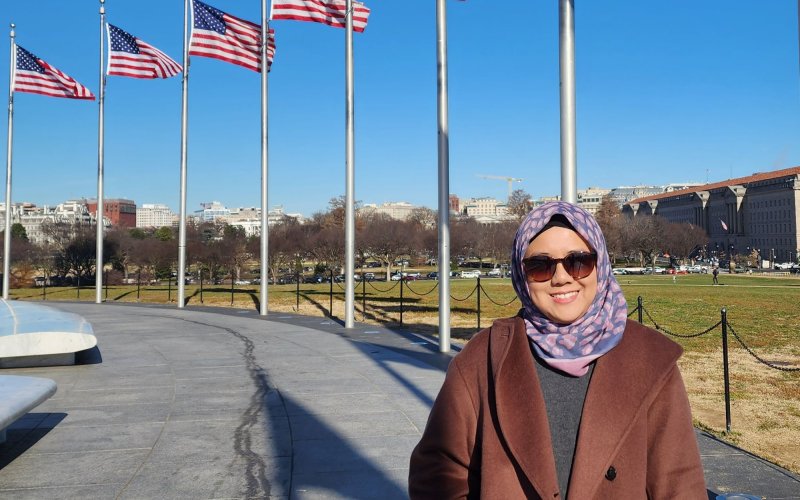Government and Accountability: 5Q with Fulbright Scholar Aira Azhari

ALBANY, N.Y. (Jan. 19, 2023) — A scholar and political analyst focusing on anti-corruption and government accountability in Malaysia is using her Fulbright grant to study at UAlbany and in Washington, D.C.
Aira Azhari, who works at the Institute for Democracy and Economic Affairs (IDEAS), a Malaysian nonprofit research institute dedicated to promoting transparency in government, spent three months last semester studying at UAlbany as a Fulbright visiting scholar, under the guidance of Professor Meredith Weiss at Rockefeller College of Public Affairs and Policy. Weiss, whose research expertise includes electoral politics and reform in Malaysia and elsewhere in Southeast Asia, has visited IDEAS, where she and Azhari met.
Azhari, who has a master of laws in public international law from the London School of Economics and Political Science and a bachelor of laws from the University of Liverpool, is now in Washington, D.C., networking with civil society organizations and foundations that work on transparency and accountability in government. Weiss is also in D.C. weekly this semester, overseeing Rockefeller College’s Semester in Washington program, so the two are able to continue working together.
What kind of change does IDEAS hope to create in Malaysian politics, and how?
IDEAS does research and advocacy on four main pillars of our work: democracy and governance, public finance, economics and business, and social policy. We work closely with other civil society organizations in Malaysia and around the region, as well as politicians from across the divide. We believe in the need to work collaboratively for changes to happen.
What led you to focus on anti-corruption and political funding in Malaysia?
Money plays such a central role in democracies around the world. Money fuels politics and, in turn, policymaking. Because of this, citizens have the right to know where this money comes from, and how politicians are raising that money. The opacity of funding sources is a huge source of corruption, which in turn distorts the level playing field in which parties in a democracy are supposed to operate on. Thus, transparency and accountability in political funding is one of the big priorities in the fight against corruption.
You studied in the UK, and have studied political systems all over the world. Is there a good model for a transparent government working well for its citizens?
At the heart of good governance is independent institutions. Parliament, the judiciary, civil servants, regulators all need to play their role without political interference. Some basic laws must be in place such as a Freedom of Information Act, which Malaysia doesn't have.
What do you hope to bring home from your studies and networking opportunities?
I hope to bring back the best elements of political finance and anti-corruption reform work, especially the lessons I learned about the areas where the U.S. system does not work very well. For example, U.S. politics are highly influenced by corporate money, which means that policymakers don’t always make laws that are in the best interests of the people. The networking contacts I've made are especially useful for IDEAS to collaborate with in the future.
Anything that surprised you, or that you have particularly liked so far about being in the States?
I have loved the weather, and shopping at Trader Joe's! America's size continues to amaze me. Hard to imagine how a country this massive can just be one country!




